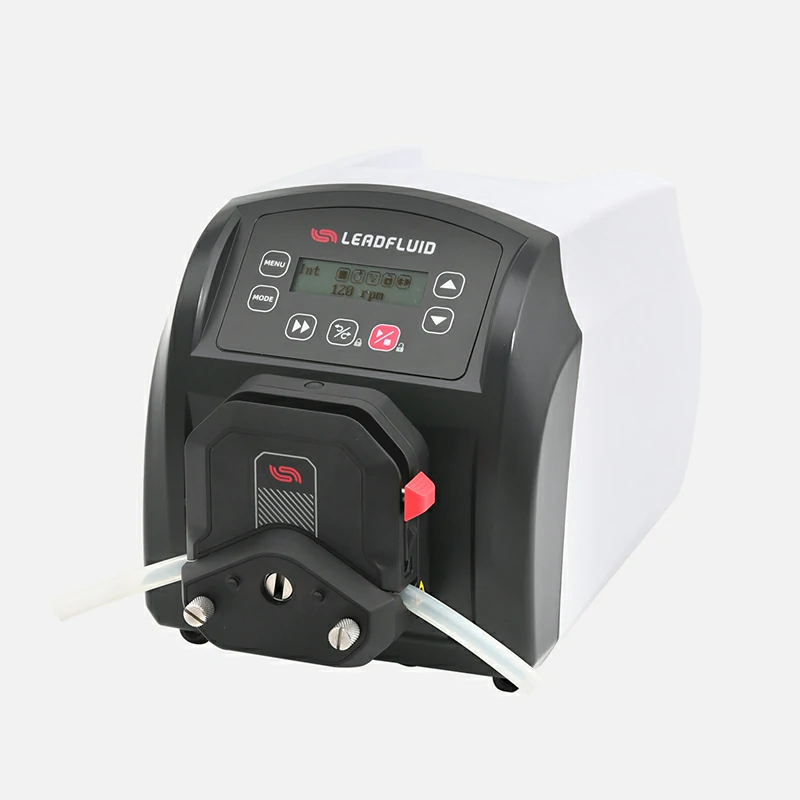A precision peristaltic pump is specifically designed for applications that require highly accurate and precise fluid delivery. It is used in situations where precise control over flow rates, dosing, and dispensing of fluids is critical.
Some of the common applications where precision peristaltic pumps are utilized include:
- Laboratory Research: Precision peristaltic pumps are extensively used in scientific research laboratories for precise and controlled delivery of fluids in various experiments, assays, and analytical procedures. They are used in chemistry, biology, biochemistry, and other fields of research that require accurate and reproducible fluid handling.
- Medical and Pharmaceutical Applications: Precision peristaltic pumps are employed in medical and pharmaceutical settings for drug delivery, infusion therapy, and other applications that require precise dosing of medications and fluids. They are used in hospitals, clinics, and medical research facilities.
- Analytical Instrumentation: Precision peristaltic pumps are integrated into analytical instruments, such as liquid chromatography systems, mass spectrometers, and other precision analytical devices. They provide accurate and consistent flow rates for sample introduction, solvent delivery, or mobile phase control in various analytical techniques.
- Microfluidics and Microbioreactors: Precision peristaltic pumps are used in microfluidic systems and microbioreactors that require precise control of fluid flow at small scales. They are employed in lab-on-a-chip devices, microreactors for chemical synthesis, or cell culture systems for accurate and controlled fluid handling.
- Industrial Applications: Precision peristaltic pumps find applications in various industrial processes that require accurate dosing and dispensing of fluids, such as chemical production, food and beverage manufacturing, and water treatment. They are used for precise addition of additives, chemicals, or ingredients in controlled quantities.
- Environmental Monitoring and Sampling: Precision peristaltic pumps are utilized in environmental monitoring projects, including water sampling, air sampling, or soil analysis. They provide accurate and controlled extraction of samples for analysis and monitoring purposes.
- Quality Control and Process Control: Precision peristaltic pumps are employed in quality control processes in industries where accurate fluid dosing is essential for maintaining product consistency and adherence to specifications. They are also used in process control applications to ensure precise fluid delivery in various manufacturing processes.
Overall, precision peristaltic pumps are used in applications that demand high accuracy, reproducibility, and precise control over fluid delivery. Their ability to provide accurate flow rates, dosing, and dispensing makes them valuable tools in laboratory research, medical settings, analytical instruments, and industrial processes where precision fluid handling is crucial.
What are the advantages of precision peristaltic pumps ?
Precision peristaltic pumps offer several advantages that make them preferred in applications requiring accurate and precise fluid delivery. Some key advantages of precision peristaltic pumps include:
- Accurate and Repeatable Flow Rates: Precision peristaltic pumps provide highly accurate and repeatable flow rates, ensuring precise control over the amount of fluid delivered. This is crucial in applications where even slight variations in flow rates can significantly impact results or processes.
- Adjustable Flow Rates: Precision peristaltic pumps allow for easy adjustment of flow rates, often through intuitive controls or programmable settings. This flexibility enables users to precisely tailor the flow rate to meet specific requirements or to accommodate changes during experiments or processes.
- Wide Range of Flow Rates: Precision peristaltic pumps can operate across a wide range of flow rates, from very low volumes to higher flow rates, depending on the specific pump model. This versatility makes them suitable for diverse applications with varying fluid delivery needs.
- Excellent Flow Rate Stability: Precision peristaltic pumps exhibit exceptional flow rate stability over extended periods of operation. They are designed to minimize flow variations caused by factors such as tubing wear, back pressure, or changes in fluid viscosity, ensuring consistent and reliable performance.
- Gentle and Non-Contaminating Fluid Handling: Peristaltic pumps operate by squeezing the fluid through a flexible tubing, preventing direct contact between the fluid and the pump mechanism. This gentle fluid handling minimizes the risk of contamination and preserves the integrity of sensitive fluids or samples.
- Compatibility with a Wide Range of Fluids: Precision peristaltic pumps are compatible with a wide range of fluids, including aqueous solutions, viscous fluids, corrosive substances, and shear-sensitive samples. The choice of tubing material can be tailored to suit the specific fluid compatibility requirements.
- Ease of Maintenance and Tubing Replacement: Precision peristaltic pumps are designed for ease of maintenance. Tubing replacement is typically straightforward, minimizing downtime and allowing for quick and efficient changes between different fluids or samples.
- Programmability and Automation Capabilities: Many precision peristaltic pumps offer programmability and automation features, allowing users to set specific dosing profiles, intervals, or sequences. This enables automated dosing processes, reduces the need for manual operation, and enhances workflow efficiency.
- Compact and Space-Efficient Design: Precision peristaltic pumps are often compact and space-efficient, making them suitable for integration into laboratory setups, analytical instruments, or other systems with limited space.
Overall, precision peristaltic pumps provide accurate, repeatable, and controlled fluid delivery in a wide range of applications. Their advantages in terms of accuracy, adjustability, flow rate stability, compatibility, and ease of use make them valuable tools in laboratory research, medical settings, and industrial processes where precision fluid handling is critical.
